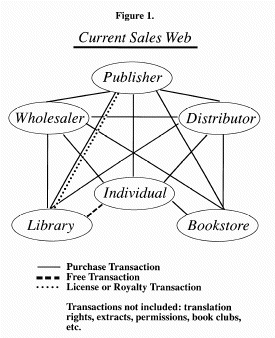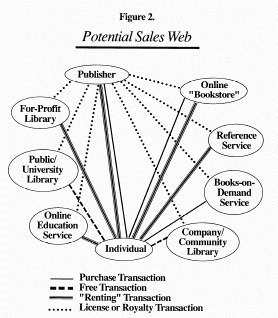
Keynote speech at the Association of American University Presses' first Electronic Publishing Workshop, June 1993.
That combination becomes directed pragmatism, something that university presses are good at.
With this pragmatism, it's important to study the problem, and understand what's happening to information these days.
It's gone digital.
Information in a book is by nature static. It stays on the acid-free page, immutable for 300 years.
Digital information is by nature plastic. It can be recognized by other agents, and can be reused in as many forms as your creativity allows.
I'm tempted, being up here, to become a preacher--
But then--I'm a pragmatist. And I ask "how can that glory help me survive as a publisher?"
That's what this workshop is about: how to use these tools to help ourselves survive.
Part of my messianic fervor--Ann Okerson of the ARL would call it "e-zealotry"--stems from my conviction that the next four years of digital system development will revolutionize our culture.
I have two metaphors that I use to explain my expectations to people. One is the fax, the other is the touchtone phone.
The touchtone phone in itself was conceived of primarily as a time-saver. Faster to dial. Used beeps instead of clicks. But from that development sprang voicemail systems with passwords and identifiers. "voicetrees" that you get at most corporations, where you usually end up hanging on a limb. Automatic redial. Calling cards. Telephone ordering. Automatic fax-backs. Automatic person-free chargecard ordering.
From one small infrastructural change, a tremendous shift was undertaken in the way we run our lives, and in what tools businesses had to work with. It changed the utility of the sending and receiving device. It made the act of phone dialing useful in itself. And it created a new infrastructure of operations and support structures.
My other analogy is that of the fax. Four years ago, we hadn't heard of it. Three years ago, we priced machines. Two years ago, most businesses bought them. A year ago, if you didn't have them, people asked why. We now assume most people have a fax-accessible number somewhere. The growth curve on that phenomenon I'd like to see--I haven't seen it yet.
Today, we fax things routinely, as a means of quick communication. Orders begin processing on faxed POs at most businesses. We fax our orders to the deli. It became, very quickly, indispensable.
That's digital information. All estimates I've seen from knowledgeable sources say that Internet accounts are growing at a rate of 10 to 15% per month. Per month!
Fast modems are cheap. Fast computers are cheap. A lot of powerful software is cheap. Powerful programming tools are cheap. And there's big, big money being thrown at the problem.
The online world is exploding, and will explode, bringing with it a tremendous transformation in the way people work with information. I can't predict it without writing a novel. Already city, state, and federal governmental agencies are making their information available online. Traffic court is handled electronically in cities in California. ADC and Food Stamp programs are using digital tools for distributed access in Texas, so that people don't need to drive into the office directly.
Network publishing will not make information too cheap to meter. In fact, the printing costs of a book--the only variable that changes in the networked environment--are generally only 15 to 20% of the overall costs of publishing. Manuscript development, peer review, copyediting, production costs like design, typesetting (read code-enrichment) and proofreading must all be considered when assessing the costs of publishing, whether that's electronic or print publishing. There are also such non-luxuries as publicity, marketing, order-fulfillment, record-keeping, and accounting which must be paid for. The value added by publishers take humanpower and brainpower, which must be financially supported. Straight-from-the-author document transmission may be cheap, but publishing isn't.
I've heard speakers at various conferences say that publishers won't be necessary in the New Online World. I think that's wrong. Publishers will survive because people want authentication and validation, both as authors and as readers. In a networked environment, the greater the volume of information, the greater the need for distillation and dependability, which publishers will provide.
University Presses will survive because scholarship, academic prestige, and tenure committees will survive. An electronic publication by a University Press will simply be more believable, trustworthy, and potentially important than an ftp-able file on WUarchive will be, or an electronic publication by Acme Publishing--not to mention more useful, attractive, and readable. Publication in high-quality form by a full-fledged publisher will be preferred by authors, and readers will prefer trustworthy documents as their mainstay of information. New forms of publishing will inevitably unfold, but the institution of publishing will not die out.
I see the Internet as the early proving ground for intellectual- and information-property problems -- and solutions -- that will be faced internationally. In five years I'm certain that there will be a wide web of communication networks available, many at very low cost. Already there are companies providing inexpensive Internet connections to anyone with a modem. Freenets and their equivalents are popping up like crocuses. The communications industry is ramping up for an intriguing and potentially chaotic blend of cablephones, online VCRs, cellular online links, realtime video conference calls over copper wires, user-choice video and audio, and virtual-reality online games. Interconnections between all these networks will be demanded by the public. And they will be made. The business sector servicing that infrastructure will blossom. We need to be ready for it.
All right. So I've pursued this point perhaps too long, but it's important that we understand that electronic publishing is no fad. It will not go away. Digital publishing is part of our future, and we must acknowledge it, or we will watch the size of our niche dwindle into obscurity over the next fifty years.
Digital texts won't replace all publishing. Books will still exist, and will probably always exist. How they're created is another question. We may be providing texts for the reader to print out in as permanent a form as she chooses. We may have the readers have reprintable books--there's already a kind of photocopier process that can be "erased" and reused inexpensively.
Books will exist, and university presses will be able to remain the quality purveyors of books that we are now. But we must also be publishing digitally.
University presses are perfectly suited to become an island of dependability in a chaotic market. If we miss making the most of the next three years, we'll be playing catchup for a long time.
It's vital that we understand the tools and the technologies that undergird digital publishing, because we must enter the market.
That market will change the way we do business dramatically. Regardless of all the things I said above, I didn't really understand the significance of the differences until I made these overheads, for a paper I gave this spring.
So we have all these wonderful publications--things people want to read, want to study, want to understand. Our main objective--beyond the prime objective of survival--is to get it into the hands of interested people.

Currently, to do that we have an intricate and interconnected web of distributors, resellers, bookstores, and individuals we serve. Bookstores often buy our books from distributors and from wholesalers and from us directly. Individuals may call our 800 number to order, or may call up their bookstore, or a wholesaler, or a distributor. Libraries may order from us or from the library wholesaler or from both. Publishers sell units, which are then resold as units.
It's easiest and cheapest for us to sell in bulk, of course, because there's less humanpower involved. We like to sell to wholesalers, and bookstores, and libraries. But if we shift to an Internet framework, suddenly a welter of new connections, new possibilities, and new "networks" appear. It's no longer prohibitively expensive to ship a single book to a customer--because you're shipping data over a line. Like the push-button phone, dozens of new ways to make information a saleable commodity will emerge.

We may sell a site-license to a library exclusively for the campus-wide network. We may license to a "virtual bookstore," which functions as a sort of "for-profit library." We may license to a new kind of entrepreneur, who builds a sort of tailored educational experience and rents it over the web, and for whom our book is one license and royalty among many he must calculate. We may license to a university the rights to sell/distribute/display a specific text for a course, but only for the duration of a course, for which the students all pay a small fee, of which the publisher and author receives some proportion. We may sell directly to the customer, providing client-server systems for online access directly, or "rent" access for referencing, or sell a text for local ownership--even for printing out locally. We may use the Internet to connect up with books-on-demand printers using Docutech or Lionheart systems--high-speed PostScript printers/binders for generating reprint-like documents.
In the networked world, we must design systems--or appropriate existing systems--that will allow us rent, sell, and license texts, to allow these very different audiences with very different needs to view, search, annotate, copy in limited fashion, and/or virtually "own" these texts. We also must be ready to provide mixed models on demand.
Scholars who "own" an annotated online text--say a server-based display-only collection of documents--will also want to make temporary connections to other publications--to check references, make glancing checks of related documents, etc. Currently, Scholar Smith owns one collection of books outright, books she purchased personally. She also has related books she's borrowed from the library. And she "rents" information via fair-use photocopying or interlibrary loan. In the near future, we must build electronic models that allow these interconnections, even foster them, thus providing scholars with what they want: to have validated, paid-for ownership, be able to "rent" certain brief connections to other titles or journal articles, and be able to borrow access from the library, who has purchased the title or journal from a publisher.
Through all of this we must be able to make these sales (at differential costs), track these licenses and sales, confirm their use and their limits, collect payments, and pay royalties to our authors accordingly, as well as provide readers with some form of authenticity check. All without having the text easily copied, thus letting the horse run from the barn out into the big wide frontier.
This is a tall order, and is why many models won't be put into practice right away. But it also needn't be done all at once, which is a relief. This web I describe is perhaps five years off, I'd say--or longer (if ever), if security systems aren't devised.
But I believe we'll find a way. We must, if we are to survive, and if scholars scholarship is to continue to benefit from our existence.
We must also acknowledge that this will happen whether we want it or not, and move forward with purpose, keeping our intentions and goals clearly in mind.
Back to Michael Jensen's home page